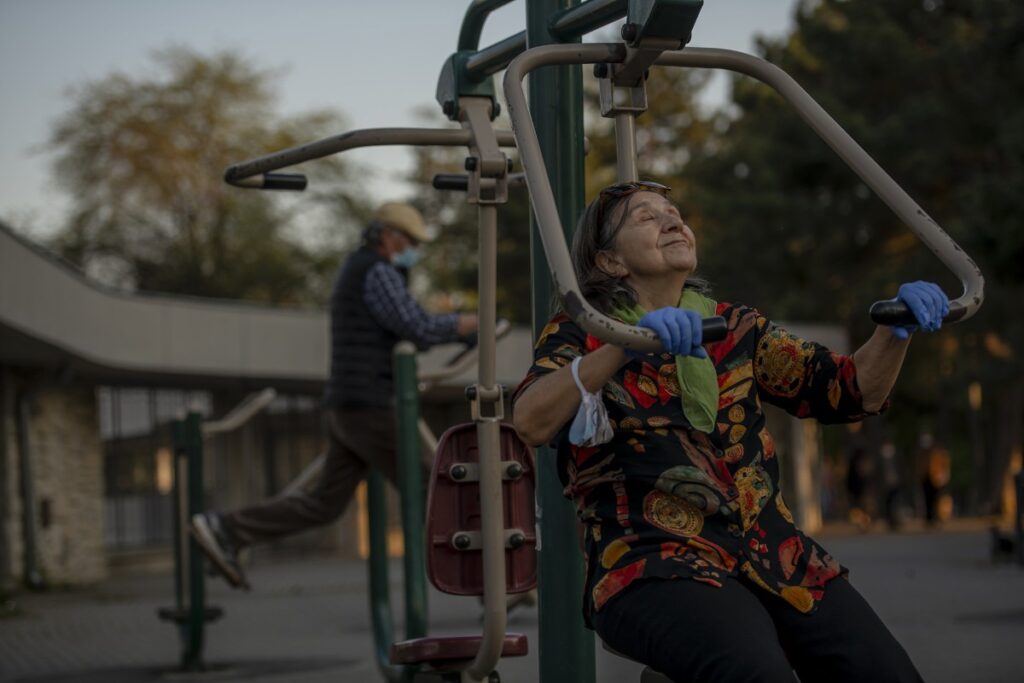Growing old is our future and Eurostat data confirms this. Projections based on data from 2019 indicate that the number of people older than 65 will double by 2050. This means that the number of elderly people in the EU will in less than three decades rise from 12.5 to 26.8 million. For years, sociologists, political scientists, and doctors have debated how much this demographic shift will change our societies. Joining forces with women from other parts of Eastern Europe, an army of women from former Yugoslavia who have come to Germany to nurse the ill and the elderly might be the first indication of these changes.
Tanja Višić’s book, Peripheral Labour Mobilities: Elder Care Work before the Former Yugoslavia and Germany, published last year by the Frankfurt publisher Campus, delves into the position of women from former Yugoslavia who took on aging Europe as a job. This ethnology brings us to a question: who do we rely on to manage our aging – meaning, our future?
Women outside of the system
Who are the caretakers of elderly and ill in Germany? The short answer, suggests Višić’s study, would be women between 30 and 59 years old, primarily from Serbia and Bosnia and Herzegovina. Between 2016 and 2018, Višić followed the experiences of care workers via text, phone and Skype calls, and interviews. She had the chance to get to know the many of her participants and their realities in person and personally.
Višić use of participant-observation as a research method meant that she personally travelled with care workers to their posts, crossed borders, and visited them across Germany. The author was expressly dedicated to illuminating the care workers’ undignified labour conditions, including the total lack of social and health care, and the illegality of this crucial but marginalised female labour in the most powerful state of the EU.
The author starts the history of this informal and unregulated labour with the liberalisation of visa regime between the Schengen countries and Serbia, North Macedonia, and Montenegro in 2009, and Bosnia and Herzegovina in 2010. From this moment citizens of these countries were able to enter and stay in the EU as tourists, the well-known 90-within-180 days in the EU. In this period, before becoming a member three years later, Croatia was also included in this group.
From then on, we can trace the departure of an ever-greater number of female care workers for 90 days of informal work in Germany, where they look after elderly, ill or disabled people. After 90 days, a ‘replacement’ comes to their post and does the same work for the same period of time. These shifts are known as ‘rotations’. Therefore, as Višić finds, this type of labour is also a lifestyle: care workers live their lives in shifts during their stay in Germany and at home.
We cannot know exactly how many women live in this way. Unrecognised by any legal framework, this labour is invisible, and there is no data that could establish the exact number of male and female workers who come to work in Germany and other EU countries.
However, research from 2010 states that 1.45 million elderly people were registered for social benefits for necessary home care in Germany. Based on this data, only 30% of these hired professional medical care and 70% remained dependent on their families. However, in 40% of the cases which declared a reliance on families or in the around 460,000 households who took over care for their elderly, family members also continued to work on full-time basis. Considering how demanding and time-consuming nursing can be, these numbers indicate a possible rise in hiring help.
Moreover, taking care of elderly people is only one part of the labour that care workers perform in households. These women also take on other household roles, such as cooking, laundry and ironing, cleaning, and gardening. Some of their employers expect them to be available non-stop and since they do not have contracts, they do not have guaranteed free time, not to mention days off. Often in rural areas, they have fewer chances for social interaction beyond their households. Negotiating salaries, work conditions, or time off are complicated process with unpredictable results.
Precariat from both sides of the border
Who are the women who take on such hard, unsecure, marginalised, and emotionally and physically demanding work? In her research, Višić makes a comparison with the so-called Gastarbeiter, workers from socialist Yugoslavia who went to Germany for work between 1953 and 1977 as a part of a formal guest worker programme and emphasises: care workers are significantly more educated than the previous generations of workers abroad. They are predominantly middle-aged women with either grown up children or younger women without children. Many of them are dual citizens with EU passports.
Crucial to understanding this labour trend is that care workers predominantly become the main wage earners in their families. They do not lack motivation; their incentives are various: the precarious and unstable working relations for care workers in their home countries; the aim to improve their families’ and their own often extremely difficult financial status, or their desire and need to become emancipated and independent from their environment. Višić emphasises on a couple of occasions that care workers are not victims, pointing out the ways in which they show their initiative, express their ingenuity and resourcefulness in their struggle with social and bureaucratic systems that more than often work against them.
Economic conditions in the countries of former Yugoslavia are, however, the inevitable factor driving the growing trend of care workers. There have been high rates of female unemployment in all former Yugoslav republics since the 1990s. However, this type of labour mobility is also a direct consequence of broader internet access which enabled the easier circulation of information and contacts through social networks, and in particular through Facebook. In this corner of the internet, care workers look for jobs, exchange experiences, advice, and instructions.
Višić in fact reached out to many of her interviewees through Facebook groups. Throughout her months – or even years – long exchanges with participants, she gained an understanding of this complex system that relies on entire networks of formal or state institutions of former Yugoslav republics and in Germany, and informal structures, such as intermediaries, hired drivers, etc. For this reason, this study often gives the impression of reading thriller.
The system that sustains this labour exchange is wide, well-coordinated, and surprisingly well-connected with the state institutions of both Germany and care workers’ home countries. First, intermediaries have turned care work into a sort of business. Themselves mostly former female care workers, they have established personal contacts or local needs, and now find posts for other care workers, organise their transport, and finally charge for their ‘services’ with more than symbolic fees. Recently a number of purpose-built ‘agencies’ started to, more or less transparently and legally, charge for finding posts, organising rotations, transport, German lessons or help with documentation. Most of these agencies operate in Serbia, but they also exist in Croatia where their transparency or legality is often also questionable.
Next in line are the border police, especially on the border between Hungary and Serbia. As care workers testify, it becomes clear at this stage the extent to which this type of labour is an open secret. The border workers are aware of the reason these women are travelling, they are often in contact with ‘agencies’ or ready to take a bribe in case, for instance, a care worker exceeds their 90 days’ stay in the EU. In order to evade problems with the border police, care workers often go to great lengths to destroy their passports and apply new ones through expedited procedures. Even administrative workers in charge of IDs are aware of documents being accidentally washed with laundry; some of them even offer innovative advice how to destroy a passport.
The Future of Ageing in and outside the EU
In the end, the deficit of care workers in Germany and other EU countries dictates this labour market. The German social and legal system plays a significant role in this sense. This system does not secure enough financial support for professional care of elderly, ill, and disabled people, does not control how individuals spend the funds intended for care, and does not supervise illegal labour. Finally and crucially, the German legal system considers the breach of labour law, in this case hiring care workers without contracts, rights nor protection, only a minor violation.
The social system of the German Federal Republic, therefore, indirectly supports this informal and unprotected female work. This is not merely a question of state bureaucracy. Care workers’ experiences show us that wider German society is aware of this parallel system of care: from local police stations to nurses and doctors in hospitals who work as intermediaries or together with them. In this sense, German society deliberately relies on exploitative labour.
They might seem a minor part of this well-coordinated mechanism of the grey labour marker between Germany and the Balkans. However, care workers are and will be the basic unit of any society that claims to offer social welfare to its citizens. When the number of elderly doubles in less than three decades, the majority of those older than 65 in the EU will be women, by a proportion of 1.24:1. If the trend of hiring women from former Yugoslav republics without basic labour rights continues – which is seemingly a well-oiled machine that no social nor legal system controls – more and more women will become care workers. However, the Balkan societies are also aging. After this study we are left with a question: who will look after these women who nursed tens if not hundreds of thousands of elderly Germans once they should need and deserve care themselves?






